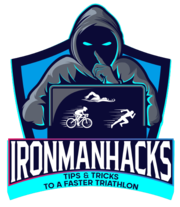This one’s always an ordeal. How much of what do I need to eat, when, and how?
The night before the race, it usually goes something like this:
“Let’s see, two gels on the beach before the swim, sip a bit of water (but not too much), then another one in T1 – no wait – might as well take that one on the bike instead of wasting transition time – hmm that’s too hard – might as well not have the gel on the bike – just drink what’s in the bottle – that’ll be carbs and sodium, yeah, but how much? I’ll figure it out later because now I need to plan how many back-up gels I need on the bike (that’s tip #34). Then on the run I better bring the sodium capsules since they’re easy to take, but how many? Oh yeah what are they going to serve at the aid stations? Hmm I never like to rely on aid station nutrition so I’ll pack a few gels for the run.”
And on and on it goes.
It’s always complicated.
And the last thing you want is to have to think through all of that the morning of your race.
The point is, do it well in advance. Come up with a plan. Here’s what you need to answer:
- How many hours will I be out there, specifically on the bike and the run where I can consume fuel?
Once you know the durations you can start planning your hourly intakes. I break up the bike and the run as they’re different contexts that will have different fuels available.
- What is my normal hourly calorie, carb, and even sodium needs (sodium may not be a concern if it’s a short race like an Olympic distance, if it’s in a cool climate, or if you are a light sweater)?
To start, you can just estimate based on your body size. Here’s a rough guide:
Calories: This could be between 100-300 depending on your size and your conditioning. It may only be about 15-20% of the calories you burn per hour.
Here’s a reference, showing calories needed, according to nutrition brand Carbopro:
Calories per hour according to body weight
| Body weight | 2 hours | 3 | 4 | 5 | 6 | 7 |
|---|---|---|---|---|---|---|
| 50kg / 110lbs | 300 | 400 | 500 | 600 | 700 | 800 |
| 60 / 132 | 400 | 500 | 600 | 700 | 800 | 900 |
| 70 / 154 | 500 | 600 | 700 | 800 | 900 | 1,000 |
| 80 / 176 | 600 | 700 | 800 | 900 | 1,000 | 1,100 |
| 90 / 198 | 700 | 800 | 900 | 1,000 | 1,100 | 1,200 |
| 100 / 200 | 800 | 900 | 1,000 | 1,100 | 1,200 | 1,300 |
Carbs: You can consider about 30-60 per hour on the bike; fewer on the run.
Sodium: If you don’t know your sodium loss per hour, estimate 800 or 1,000mg for a hot race, especially a 70.3 or longer. Otherwise you can go lower.
Note that these are only estimates and they vary widely by individual. Test it out and learn for yourself. This may take time and patience.
I will input these values into the nutrition calculator here and then select the various foods or fuels I have on hand or expect to have in the race to figure out how many servings of each to bring.
Then I put all of these products in my packing checklist and make sure I bring them to the race.
- What has worked for me in the past or more critically what has not worked for me in the past?
I think about my nutrition beyond the race, including my breakfast the day before. Usually, the rule is not to eat too many high-fat foods the day before or the morning-of. For example, don’t have a steak the night before – it’s a big thing to digest.
In the morning, some people prefer light snacks of fruit, coffee, a bit of bread. I know what works for me and just leave it at that. Once you’ve figured that out, you can set it and forget it. Then think about refining your in-race nutrition as that’s a lot more critical and tricky.
Finally, I mix up my bottles with the right combination and concentration of products. It could be a mix of an electrolyte product, endurance fuel, and water, and I put these bottle in the fridge.
UCAN has a great electrolyte product called Hydrate, and it has more sodium per gram than any other product I’ve seen out there.
Get 15% off all UCAN products using the promo code “IRONMANHACKS” at checkout.
(I will earn a small commission if you buy from that link – thanks.)
